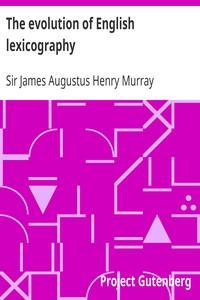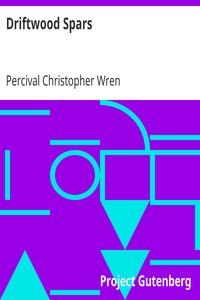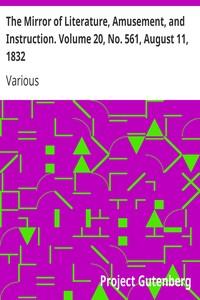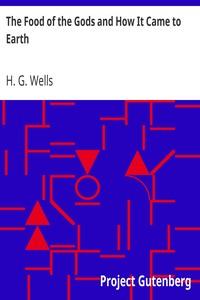|
|
Read this ebook for free! No credit card needed, absolutely nothing to pay.Words: 15842 in 3 pages
This is an ebook sharing website. You can read the uploaded ebooks for free here. No credit cards needed, nothing to pay. If you want to own a digital copy of the ebook, or want to read offline with your favorite ebook-reader, then you can choose to buy and download the ebook.

: The evolution of English lexicography by Murray James Augustus Henry Sir - English language Lexicography History; Encyclopedias and dictionaries History and criticism@FreeBooksTue 06 Jun, 2023 THE ROMANES LECTURE 1900 The Evolution of English Lexicography BY JAMES A.H. MURRAY M.A., LL.D., D.C.L., PH.D. DELIVERED IN THE SHELDONIAN THEATRE, OXFORD, JUNE 22, 1900 In their practical use the Vocabulary and the Glossary fulfilled similar offices; and so they were often combined; the possessor of a Vocabulary enlarged it by the addition of a Glossary, which he or some one before him had copied out and collected from the glossed manuscripts of his bibliotheca. He extended it by copying into it vocabularies and glossaries borrowed from other scholars; he lent his own collection to be similarly copied by others. Several such collections exist formed far back in Old English times, the composite character of which, partly glossary, partly vocabulary, reveals itself upon even a cursory examination. A still later scribe making a copy of this vocabulary, or possibly combining two or three lists already in first-letter order, carried the alphabetical arrangement one stage further; instead of transcribing the A-words as they stood, he went through them, picking out first those that began with Aa-, then those in Ab-, then those in Ac-, and so on, to Az. Then he did the same with the B-words, picking out first all in Ba-, then Be-, Bi-, Bl-, Bo-, Br-, Bu-, By-; and so exhausting the B-words. Thus, at length, in this second recension, the Vocabulary stood, not yet completely alphabetical, but alphabetized as far as the second letter of each word. Learning and literature, science and art, had attained to fair proportions in England, and in the Old English tongue, when their progress was arrested by the Norman Conquest. The Norman Conquest brought to England law and organization, and welded the country into a political unity; but it overthrew Old English learning and literary culture. In literary culture the Normans were about as far behind the people whom they conquered as the Romans were when they made themselves masters of Greece; and it was not till some two generations after the Conquest, that learning and literature regained in England somewhat of the position which they had occupied two centuries earlier. And this new literary culture was naturally confined to the French dialect of the conquerors, which had become the language of court and castle, of church and law, of chivalry and the chase; while the rich and cultured tongue of Alfred and AElfric was left for generations without literary employment, during which time it lost nearly all its poetical, philosophical, scientific, and artistic vocabulary, retaining only the words of common life and everyday use. And for more than 300 years after the Conquest English lexicography stood still. Between 1066 and 1400, Wright-W?lcker shows only two meagre vocabularies, occupying some twenty-four columns of his volume. One of these, of the twelfth century, is only an echo of the earlier literary age, a copy of a pre-Conquest glossary, which some scribe who could still read the classical tongue of the old West Saxon Court, transliterated into the corrupted forms of his own generation. The other is a short vocabulary of the Latin and vernacular names of plants, a species of class-vocabulary of which there exist several of rather early date. But when Baret at length resolved to comply with this suggestion, there were many difficulties to be overcome, the expense of the work being not the least:-- 'And surelie, had not the right honourable Sir Thomas Smith knight, principall Secretarie to the Queenes Maiestie, that noble Theseus of learning, and comfortable Patrone to all Students, and the right Worshipfull M. Nowell, Deane of Pawles, manie waies encouraged me in this wearie worke I had neuer bene able alone to haue wrestled against so manie troubles, but long ere this had cleane broken off our worke begun, and cast it by for euer.' A friend and louer of thy paines, IOHN FORD. It is noticeable that all these references to the needs of women disappear from the later editions, and are wanting in later dictionaries after 1660; whether this was owing to the fact that the less-knowing women had now come upsides with the more-knowing men; or that with the Restoration, female education went out of fashion, and women sank back again into elegant illiteracy, I leave to the historian to discover; I only, as a lexicographer, record the fact that from the Restoration the dictionaries are silent about the education of women, till we pass the Revolution settlement and reach the Age of Queen Anne, when J.K. in 1702 tells us that his dictionary is 'chiefly designed for the benefit of young Scholars, Tradesmen, Artificers, and the female sex, who would learn to spell truely.' Time and space forbid me even to recount the later dictionaries of this class and period; we need only mention that of Elisha Coles, a chorister and subsequently matriculated student of Magdalen College , a meritorious work which passed through numerous editions down to 1732; and that of Edward Cocker, the celebrated arithmetician and writing-master of St. George's, Southwark, by whom people still sometimes asseverate 'according to Cocker.' This was published after his death, 'from the author's correct copy,' by John Hawkins, in 1704, with a portrait of the redoubtable Cocker himself in flowing wig and gown, and the following lines:-- Free books android app tbrJar TBR JAR Read Free books online gutenberg More posts by @FreeBooks
: Driftwood Spars The Stories of a Man a Boy a Woman and Certain Other People Who Strangely Met Upon the Sea of Life by Wren Percival Christopher - India History British occupation 1765-1947 Fiction@FreeBooksTue 06 Jun, 2023

: Calvert of Strathore by Goodloe Abbe Carter - Historical fiction; France History Revolution 1789-1799 Fiction; Paris (France) Fiction; Americans France Fiction; Jefferson Thomas 1743-1826 Fiction@FreeBooksTue 06 Jun, 2023
|
Terms of Use Stock Market News! © gutenberg.org.in2025 All Rights reserved.






